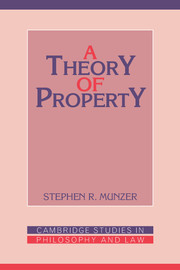Book contents
- Frontmatter
- Contents
- Preface and acknowledgments
- 1 Property, justification, and evaluation
- Part I Property rights and personal rights
- Part II From individuals to social context
- Part III Justification and distributive equity
- Part IV Applications
- 12 Business corporations
- 13 Gratuitous transfers
- 14 A moral and political theory of takings
- 15 Takings and the constitution
- Table of cases
- Index of names
- Index of subjects
14 - A moral and political theory of takings
Published online by Cambridge University Press: 05 June 2012
- Frontmatter
- Contents
- Preface and acknowledgments
- 1 Property, justification, and evaluation
- Part I Property rights and personal rights
- Part II From individuals to social context
- Part III Justification and distributive equity
- Part IV Applications
- 12 Business corporations
- 13 Gratuitous transfers
- 14 A moral and political theory of takings
- 15 Takings and the constitution
- Table of cases
- Index of names
- Index of subjects
Summary
TAKINGS AND TAXINGS
Government takings of private property pose at least two problems. One is a legal problem: How should a legal system deal with situations in which government action adversely affects private holdings? In many countries, this is a problem mainly of constitutional law rather than statutory or common law. In the United States, it centers on the command of the Fifth Amendment, known as the takings clause, that “nor shall private property be taken for public use, without just compensation.” The other problem is one of moral and political theory: How should a society deal with situations in which government action adversely affects private holdings? It is important to distinguish the two problems because the adoption of constitutional and other institutionalized legal norms can affect the applicability of any abstract solution offered by moral and political theory. The moral and political problem is more fundamental because an answer to it should guide an answer, and if necessary correct an existing answer, to the legal problem.
This chapter applies the basic theory of property to the moral and political problem of takings. The next chapter extends the answer to that problem to the legal problem of takings under the United States Constitution. A “taking,” in this context, is thus an adverse effect on private property caused by government action. Obviously, the answers to these problems are of greatest interest for a private-property economy as defined in § 5.1, because it has private ownership of the means of production.
- Type
- Chapter
- Information
- A Theory of Property , pp. 419 - 441Publisher: Cambridge University PressPrint publication year: 1990

